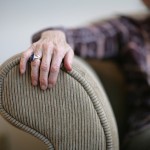
It’s a sad fact of life that as people get older they sometimes find themselves living a lonely lifestyle; cut off from stimulating social networks and all of the activities and benefits that friendships entail. Social exclusion and a lack of frequent interaction may predict impaired cognition in the older members of the population.
Researchers from Finland have conducted a randomised controlled trial to determine the effects of socially stimulating group intervention on cognition among older individuals suffering from loneliness. They recruited 235 people aged ≥75 years from 7 day care centres in Finland and randomised them to either:
- Control group: 3 months of usual care
- Intervention group: 3 months of group intervention aimed to enhance interaction and friendships between participants and to socially stimulate them. Each group was facilitated by two specifically trained professionals. In addition to active discussions, the groups included three types of activities depending on the participants’ interests:
- therapeutic writing
- group exercise
- art experiences
The control and intervention groups were similar at baseline with respect to their demographics, disease burden, depression, and cognition.
Cognition outcomes were measured using the Alzheimer’s Disease Assessment Scale (ADAS-Cog), and mental function was measured by the 15D measure.
Here’s what they found:
- The people receiving the psychosocial group intervention had better cognition scores after 3 months than the control group, with mean changes being -2.6 points (95% confidence interval [CI]: -3.4 to -1.8) and -1.6 points (95% CI: -2.2 to -1.0), respectively
- Mental function also showed significant improvement in the group intervention at 12 months (+0.048, 95% CI: +0.013 to +0.085) compared with the control group (-0.027, 95% CI: -0.063 to +0.010)
The authors concluded that:
Psychosocial group intervention improved lonely older people’s cognition.
Pitkala KH, Routasalo P, Kautiainen H, Sintonen H, Tilvis RS. Effects of socially stimulating group intervention on lonely, older people’s cognition: a randomized, controlled trial. Am J Geriatr Psychiatry. 2011 Jul;19(7):654-63. [PubMed abstract]

Readers might like to know that the Social Care Institute for Excellence have just published a research briefing on social isolation and loneliness in adults. The briefing focuses on prevention and is available in full-text PDF on their website.
Windle K, Francis J and Coomber C. Preventing loneliness and social isolation: interventions and outcomes (PDF). SCIE Research briefing 39, Oct 2011.
Cheers,
The Mental Elf
Excellent! This is a perfect balance for the article on drugging the elderly with antidepressants.